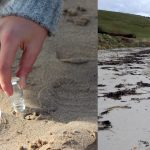

Scapa Flow microplastic levels match industrial UK waters

Sediment samples from the beaches around Scapa Flow have a similar level of microplastics to the industrialised, highly populated Clyde and Firth of Forth areas, research from Heriot-Watt University shows.
Scientists from Heriot-Watt and Orkney Islands Council took over 100 sediment samples from 13 locations around the Scapa Flow, and compared them to samples from the Clyde and Firth of Forth.
The results showed that microplastics were present in all 13 samples taken from Scapa Flow, despite its remoteness and Orkney’s small population.
Orkney Islands Council will now routinely test for microplastics during its annual sandy shore monitoring programme, and Heriot-Watt University will provide analysis.
Dr Mark Hartl, associate professor of marine biology at Heriot-Watt University, is calling for a nationwide effort to establish a baseline for microplastics in UK waters, as part of the university’s Year of the Sea.
Dr Mark Hartl said: “Heriot-Watt has named 2018 as our Year of the Sea, and these are surprising results to begin our research and engagement programme with.
“The fact that a relatively remote island has similar microplastic levels to some of the UK’s most industrialised waterways was unexpected, and points to the ubiquitous nature of microplastics in our water systems.
“We need a baseline for all of the UK’s waters, so that we can assess the impact of government policies that aim to reduce marine pollution, such as the microbead ban. At present we only have a patchwork of data from studies in Scotland and comparable North Sea locations.
“The growing amount of data regarding plastic litter contamination in the marine environment has led to the need for understanding the related risks not only to the health of marine life, but to humans as well: microplastics are working their way into our food chain.
“We will take further samples in Orkney in April, and scientists across Heriot-Watt’s global campuses are focusing on marine research during the Year of the Sea, from surveying Scottish seabeds to monitoring jellyfish blooms and algae blooms.”
Jenni Kakkonen, a biologist with Orkney Islands Council’s harbour authority’s marine environmental unit, conducted the sampling in Orkney with her team, collecting the sediment samples across Scapa Flow. She is also a part-time PhD student at Heriot-Watt’s International Centre for Island Technology (ICIT) in Orkney.
She said: “It’s important we keep an eye on the seas around us through research of this kind.
“The sites in Scapa Flow are part of Orkney Islands Council’s sandy shore monitoring programme and during our annual surveys it was easy to collect the 3cm sand core samples for the microplastics project.
“It came as a surprise to me as well that there was no significant difference between average particle and fibre concentrations found in the Scapa Flow, Clyde and Firth of Forth.”
The findings were published in Marine Pollution Bulletin and can be read in full here: http://www.sciencedirect.com/science/article/pii/S0025326X17305908?via%3Dihub.
Visit www.hw.ac.uk/yearofthesea for more information.